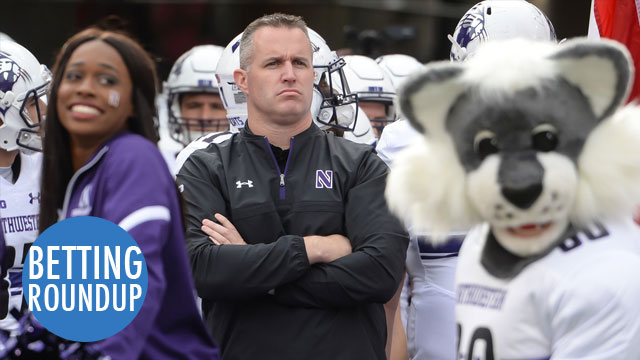A 16-inning baseball game caused an issue at the new FanDuel sportsbook in New Jersey.
The Phillies defeated the Dodgers 7-4 in 16 innings. The game ended at approximately 1:15 a.m. ET Wednesday, after the book’s vault had locked and was unable to be accessed. A group of approximately 10 bettors were told by a book supervisor that they would need to return later in the afternoon to get their winnings.
“The FanDuel sportsbook’s business hours of operation last night were to 1 a.m., as clearly posted throughout the facility,” a FanDuel spokesperson said in a statement. “Once 1 a.m. hits, our cages are closed. We cannot take wagers or pay out wagers after that time. To be clear, there was no issue with cash on hand. All customers are welcome to return today to collect any winnings, or to mail in any winning tickets for payment.”
Sports betting was a topic at Big Ten media days earlier this week.
Gambling could create problems for coaches around the country, and Northwestern’s Pat Fitzgerald took a similar stance as the conference’s commissioner.
“I think it’s, first and foremost, important that we educate our guys and the understanding of the issues that surround gambling and understand from a standpoint of what may end up happening to them in dorms, people asking them questions that maybe they’ve never been asked before — these new instant friends that they have as true freshmen, things of that nature,” Fitzgerald said.
Another important piece to the betting puzzle is the potential enactment of nationwide injury reports, which would affect the play on the field and game planning in addition to those with interests in gambling.
The NFL already has an injury report system in which players are reported as active, probable, doubtful, and out, but in the college sphere, there are many different reasons that athletes could be inactive.
To protect the players in a way, second-year Minnesota head coach P.J. Fleck wants an availability report without all of the excess information.
“I don’t need to know why, whether it’s a suspension, whether it’s an injury, whether it’s a knee, whether it’s grades, whether it’s disciplines — I don’t need to know all that,” Fleck said. “But I’m a huge advocate. I’d love to be able to see who is going to be able to play and not play.”
Jay Paterno, former Penn State quarterbacks coach, said he thinks college football conferences should receive an “information tax” for providing injury reports with a share of it going to every player upon graduation.
From an ethical standpoint, as sports books all over the country start taking action on college sports, it will be another example of money being made on the performance of college athletes. Injury and availability information has a value to the people in that industry, a value directly derived from the student-athletes.
So if the gambling industry and the football conferences want schools to release injuries, players should resist and at least ask for part of the action. The conferences should get an “information tax” on every wager on their games with a share of that money pool given to every player upon graduation from college.
There is no arguing that the money being wagered on college athletes is a direct result of their labor. There is also no arguing that injury information belongs to and is the property of the student-athletes. So a payment, even one that is deferred, is warranted if conferences are going to compel schools to give that information away at the expense of players’ privacy.
GOLF.com takes a look at “SuperLive” betting.
It’s approaching noon on a Friday. Five televisions on the wall are screening live feeds of the second round of the 2018 Players Championship. On one, Bubba Watson, wielding his pink driver, sails his tee shot on the first hole deep into the trees.
“He’s an underdog to make par here,” Martin de Knijff says.
An intense but amiable man in his mid-40s, with a dark goatee and a gleaming pate, he is watching the broadcast from behind a conference table, flanked to his right by three colleagues at computers.
“Put him at plus-one-twenty,” de Knijff says.
A coworker clacks a keyboard, and on one of the TVs, up pop those odds, alongside Golf Channel’s coverage of the hunt for Bubba’s ball.
“Let’s see what kind of lie he has,” de Knijff says. “Maybe I should have made him an even bigger ‘dog.”
Triple Crown winner Justify was retired from racing earlier this week.
Trainer Bob Baffert and Justify’s owners said caution over the horse’s ankle condition made it impossible to tell if he’d be healthy enough to race by the fall.
“What a way to go out: never beaten, won the Triple Crown,” jockey Mike Smith said by phone. “He’s happy, healthy. That’s just beautiful.”
Baffert said Justify wasn’t responding quickly enough to treatment to be able to race in the next few months, so the decision was made to retire him.
“We all wanted to see Justify run again, but ultimately it is my responsibility to make sure he is perfect,” Baffert said. “Without 60-90 days, I can’t be definite.”
* * *
Each Friday, we’ll comb through as many articles, tweets and podcasts as we can find related to the world of sports betting and daily fantasy sports, and publish the good stuff here.
Stumble upon something you think we should include? Email info@bettingtalk.com.
